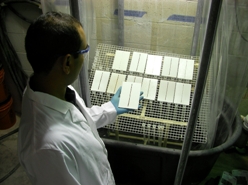The wildfires currently raging in the southwestern United States bring issues of land management into the public eye. Land management actions, such as prescribed fire, grazing, herbicides, felling trees and mowing, can restore native plants and reduce wildfire. However, the public’s view of land management and their trust in land management agencies can pose another obstacle.
Rural landscapes of the future might have pyrolysis plants instead of grain elevators on every horizon —processing centers where farmers would bring bulky crops such as switchgrass to be made into crude oil.
Taking another major step in sleuthing the 2010 Deepwater Horizon oil spill, a research team led by the Woods Hole Oceanographic Institution (WHOI) has determined what chemicals were contained in a deep, hydrocarbon-containing plume at least 22 miles long that WHOI scientists mapped and sampled last summer in the Gulf of Mexico, a residue of the Deepwater Horizon oil spill.
The findings were reported in a special issue of the Earth, Planets and Space (EPS) journal. The research was sponsored the National Science Foundation (NSF) and by the Southern California Earthquake Center (SCEC).
A combination of two ordinary materials – graphite and water – could produce energy storage systems that perform on par with lithium ion batteries, but recharge in a matter of seconds and have an almost indefinite lifespan.
In the Science journal, a review paper titled, “Trophic Downgrading of Planet Earth,” concludes that the decline of large predators and herbivores in all regions of the world is causing substantial changes to Earth’s terrestrial, freshwater and marine ecosystems.
Researchers at the University of Illinois have recorded an airglow signature in the upper atmosphere produced by a tsunami using a camera system based in Maui, Hawaii.
Farmers and other astute observers of nature have long known that crops like corn and sorghum grow taller at night. But the biochemical mechanisms that control this nightly stem elongation, common to most plants, have been something of a mystery to biologists—until now.
At a pilot facility in Singapore, Siemens has cut the energy needed to desalinate seawater by more than 50 percent.
The U.S. Environmental Protection Agency recently announced plans to improve its Integrated Risk Information System program as part of an ongoing effort initiated in 2009 to strengthen the program.
In a test project, researchers plan to inject some 20,000 tons of carbon dioxide into a coalbed methane field in southwest Virginia, at a site that is not suitable for underground mining purposes.
About 55 million years ago, the Earth burped up a massive release of carbon dioxide into the atmosphere – an amount equivalent to burning all the petroleum and other fossil fuels that exist today.
As one of the planet’s largest single carbon absorbers, the ocean takes up roughly one-third of all human carbon emissions, reducing atmospheric carbon dioxide and its associated global changes.But whether the ocean can continue mopping up human-produced carbon at the same rate is still up in the air.
Since 1998, climate scientists have attempted to reconstruct global annual temperature over the last millennium using natural proxies such as tree rings and ice cores. However, a new study finds substantial uncertainty in these reconstructions.
Which U.S. metro region is most likely to come out of the next recession, natural disaster or other regional “shock” relatively unscathed? Rochester, Minn. A little more battered might be College Station-Bryan, Texas.
The National Science Foundation has awarded a five-year, $10 million grant to Florida State University and the University of Florida to coordinate 92 institutions in 45 states working to digitize the nation’s biological collections.

Chemically bonded phosphate ceramics create a passivation layer that stops corrosion and is protected by a tough ceramic outer layer. These compounds protect metal from corrosion better than other options, such as polymer paints, and are less expensive than using stainless steel.
Originally proposed as a small gathering of EVTV viewers, the concept grew into more of a convention within two weeks of the announcement due to the number of early registrants.
Researchers have discovered a way to capture and harness energy transmitted by such sources as radio and television transmitters, cell phone networks and satellite communications systems.
The prospect of rising temperatures in Iowa and the Midwest is predicted to lead to a dramatic decline in corn yield. With a $5 million grant from the U.S. Department of Agriculture, Iowa State University researchers are looking to develop a corn variety that maintains the region’s high yields even as temperatures rise.